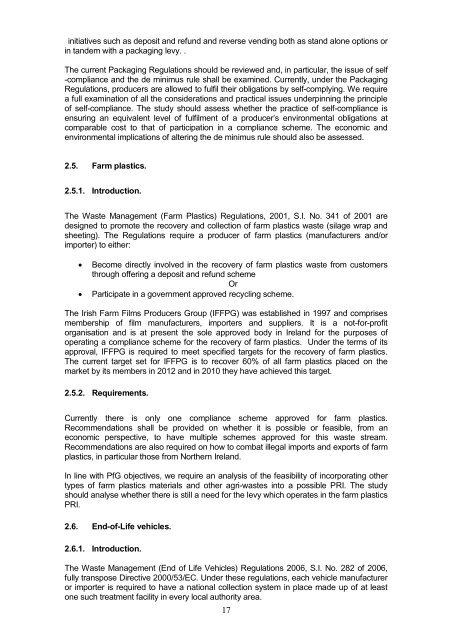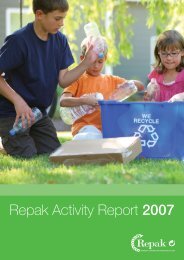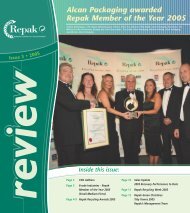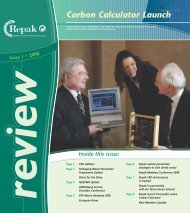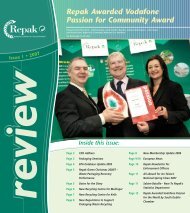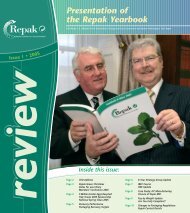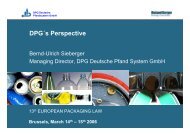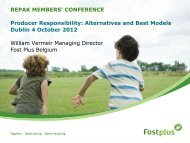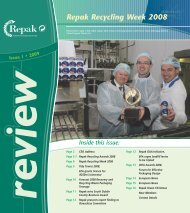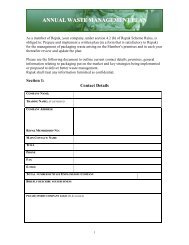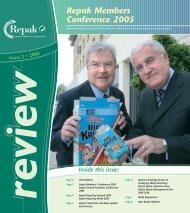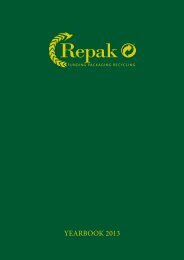Review Of The Producer Responsibility Initiative Model In ... - Repak
Review Of The Producer Responsibility Initiative Model In ... - Repak
Review Of The Producer Responsibility Initiative Model In ... - Repak
You also want an ePaper? Increase the reach of your titles
YUMPU automatically turns print PDFs into web optimized ePapers that Google loves.
initiatives such as deposit and refund and reverse vending both as stand alone options or<br />
in tandem with a packaging levy. .<br />
<strong>The</strong> current Packaging Regulations should be reviewed and, in particular, the issue of self<br />
-compliance and the de minimus rule shall be examined. Currently, under the Packaging<br />
Regulations, producers are allowed to fulfil their obligations by self-complying. We require<br />
a full examination of all the considerations and practical issues underpinning the principle<br />
of self-compliance. <strong>The</strong> study should assess whether the practice of self-compliance is<br />
ensuring an equivalent level of fulfilment of a producer’s environmental obligations at<br />
comparable cost to that of participation in a compliance scheme. <strong>The</strong> economic and<br />
environmental implications of altering the de minimus rule should also be assessed.<br />
2.5. Farm plastics.<br />
2.5.1. <strong>In</strong>troduction.<br />
<strong>The</strong> Waste Management (Farm Plastics) Regulations, 2001, S.I. No. 341 of 2001 are<br />
designed to promote the recovery and collection of farm plastics waste (silage wrap and<br />
sheeting). <strong>The</strong> Regulations require a producer of farm plastics (manufacturers and/or<br />
importer) to either:<br />
<br />
<br />
Become directly involved in the recovery of farm plastics waste from customers<br />
through offering a deposit and refund scheme<br />
Or<br />
Participate in a government approved recycling scheme.<br />
<strong>The</strong> Irish Farm Films <strong>Producer</strong>s Group (IFFPG) was established in 1997 and comprises<br />
membership of film manufacturers, importers and suppliers. It is a not-for-profit<br />
organisation and is at present the sole approved body in Ireland for the purposes of<br />
operating a compliance scheme for the recovery of farm plastics. Under the terms of its<br />
approval, IFFPG is required to meet specified targets for the recovery of farm plastics.<br />
<strong>The</strong> current target set for IFFPG is to recover 60% of all farm plastics placed on the<br />
market by its members in 2012 and in 2010 they have achieved this target.<br />
2.5.2. Requirements.<br />
Currently there is only one compliance scheme approved for farm plastics.<br />
Recommendations shall be provided on whether it is possible or feasible, from an<br />
economic perspective, to have multiple schemes approved for this waste stream.<br />
Recommendations are also required on how to combat illegal imports and exports of farm<br />
plastics, in particular those from Northern Ireland.<br />
<strong>In</strong> line with PfG objectives, we require an analysis of the feasibility of incorporating other<br />
types of farm plastics materials and other agri-wastes into a possible PRI. <strong>The</strong> study<br />
should analyse whether there is still a need for the levy which operates in the farm plastics<br />
PRI.<br />
2.6. End-of-Life vehicles.<br />
2.6.1. <strong>In</strong>troduction.<br />
<strong>The</strong> Waste Management (End of Life Vehicles) Regulations 2006, S.I. No. 282 of 2006,<br />
fully transpose Directive 2000/53/EC. Under these regulations, each vehicle manufacturer<br />
or importer is required to have a national collection system in place made up of at least<br />
one such treatment facility in every local authority area.<br />
17


